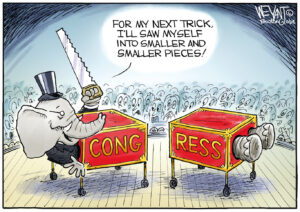How to Put Impeachment Back on the Table
Former Congresswoman Elizabeth Holtzman writes in The Nation that in the year since she called for Bush's impeachment, the case against him has only gotten stronger. Just because Nancy Pelosi has taken impeachment off the table, Holtzman argues, doesn't mean it isn't going to happen.
Former Congresswoman Elizabeth Holtzman writes in The Nation that in the year since she called for Bush’s impeachment, the case against him has only gotten stronger. Just because Nancy Pelosi has taken impeachment off the table, Holtzman argues, doesn’t mean it isn’t going to happen.
Your support matters…The Nation:
Public anger at Bush has been mounting. On November 7 voters swept away Republican control of the House and Senate. The President’s poll numbers continue to drop.
These facts should signal a propitious moment for impeachment proceedings to start. Yet House Speaker Nancy Pelosi has taken impeachment “off the table.” (Impeachment proceedings must commence in the House of Representatives.) Her position doesn’t mean impeachment is dead; it simply means a different route to it has to be pursued. Congressional investigations must start, and public pressure must build to make the House act.
This is no different from what took place during Watergate. In 1973 impeachment was not “on the table” for many months while President Nixon’s cover-up unraveled, even though Democrats controlled the House and Senate. But when Nixon fired the special prosecutor to avoid making his White House tapes public, the American people were outraged and put impeachment on the table, demanding that Congress act. That can happen again.
Congressional and other investigations that previously found serious misconduct in the Nixon White House made the public’s angry reaction to the firing of the special prosecutor–and the House response with impeachment proceedings–virtually inevitable. Early in 1973, once it appeared that the cover-up might involve the White House, the Senate created a select committee to investigate. The committee held hearings and uncovered critical evidence, including the existence of a White House taping system that could resolve the issue of presidential complicity. The Senate also forced the Attorney General to appoint a special prosecutor to investigate Watergate. Other committees looked into related matters. None of the investigations were prompted by the idea of impeachment. Still, they laid the groundwork for it–and the evidence they turned up was used by the House impeachment panel to prepare articles of impeachment against Nixon.
The same approach can govern now. Senate and House committees must commence serious investigations that could uncover more evidence to support impeachment. The investigations should ascertain the full extent of the President’s deceptions, exaggerations and lies that drove us into the Iraq War. (They can simply in effect resurrect Republican Senator Howard Baker’s famous questions about Richard Nixon: “What did the President know and when did he know it?”) Congress should also explore the wiretapping that has violated the FISA law, the President’s role in mistreatment of detainees and his gross indifference to the catastrophe facing the residents of New Orleans from Katrina.
Independent journalism is under threat and overshadowed by heavily funded mainstream media.
You can help level the playing field. Become a member.
Your tax-deductible contribution keeps us digging beneath the headlines to give you thought-provoking, investigative reporting and analysis that unearths what's really happening- without compromise.
Give today to support our courageous, independent journalists.






You need to be a supporter to comment.
There are currently no responses to this article.
Be the first to respond.